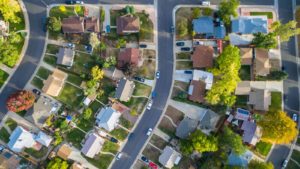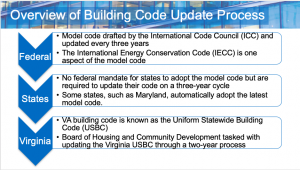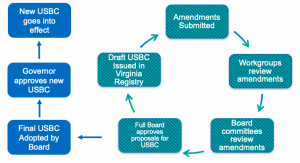Building Codes

Updated building codes will increase energy efficiency.
Uniform Statewide Building Code Regulatory Updates
The current Uniform Statewide Building Code (USBC) went into effect on January 18, 2024, and includes a variety of enhancements from the 2021 International Energy Conservation Code (IECC), including window fenestration, lighting, ventilation, and wall insulation. Additionally, some Virginia-specific changes are included relating to HVAC sizing in new additions.
On March 10, 2025, the Board of Housing and Community Development approved a Notice of Intended Regulatory Action (NOIRA) to begin the 2024 Code Development Cycle and update the Uniform Statewide Building Code (USBC). On April 1, 2025, Virginia’s online code development system (cdpVA) opened for submission of code change proposals for the 2024 Code Development Cycle. The tentative deadline for submission of code change proposals for the 2024 update is October 1, 2025.
Virginia Regulatory Process
Before Virginia begins the process to update the state building code, the model code is updated at the federal and international level. The International Code Council (ICC) is a membership-based organization that produces an updated model code every three years (2015, 2018, 2021, etc.). While states are not mandated to use the model code, many use it as a starting point to develop their own state code, like Virginia, while other states adopt the model code as is, such as Maryland. For even more details on the energy code process at the federal level, DOE has a great blog post detailing each step.

Virginia’s building code is known as the Uniform State Building Code (USBC). The Department of Housing and Community Development oversees the two-year code update process, which includes stakeholder input, public meetings, and board actions. The Board of Housing and Community Development is comprised of 14 members representing each of Virginia’s 11 congressional districts and three ex-officio members representing the Virginia Fire Services Board, the Virginia Building Code Officials Association, and the Virginia Housing Development Authority. Each member is appointed by the Governor to 3-year terms with a two-term limit. Historically, this board has been comprised entirely of home-builders. However, over the last several years, building science experts and community development advocates have also been appointed to the Board.
The diagram below explains the two-year USBC update process:

The update process begins with proposal submissions via the DHCD codes portal. Anyone can submit a proposal to the portal. Proposals are reviewed by open, public workgroups and voted on by those in attendance. Proposals move forward to the next phase of the process with a workgroup recommendation of either consensus, non-consensus or rejection. It only takes one “no” vote for a proposal to be marked as non-consensus. All proposals are then reviewed by the DHCD Board Codes and Standards committee, which also makes recommendations to the full Board. The full Board then reviews all proposals and votes to adopt either the draft (year one) or final (year two) USBC. This process is repeated both years. Once the final USBC is approved by the Board in year two, it goes to the Attorney General and the Governor to sign off as well. Once the updated USBC goes into effect, there is a one year grace period before it is enforced.
Additionally, there are several comment periods and public hearings throughout the two-year process.
Code Compliance and Enforcement
Check here for more details as the code updating process moves forward. The Virginia Building and Codes Association is also a great resource for code compliance questions.
Resources
Check out our April 2022 blog post for all of the amendments we supported during this process.
View the VAEEC’s comments on the 2020 draft of the USBC.
View our comments on the 2016/2017 USBC update here.
View our Building Codes recommendations in our report: Why Energy Efficiency is a Smart Investment for Virginia.
June 2018 Webinar: Building Envelope Improvements in Large Buildings
April 2017 Webinar: Preparing for the Building Code Public Comment Period
December 2016 Webinar: Building Codes as an Energy Efficiency Driver in Virginia
VAEEC Blog Posts & Updates
News Articles
20
Jan 17
28
Dec 16
The 2018 Building Energy Code Holds the Line for Efficiency
14
Nov 16
